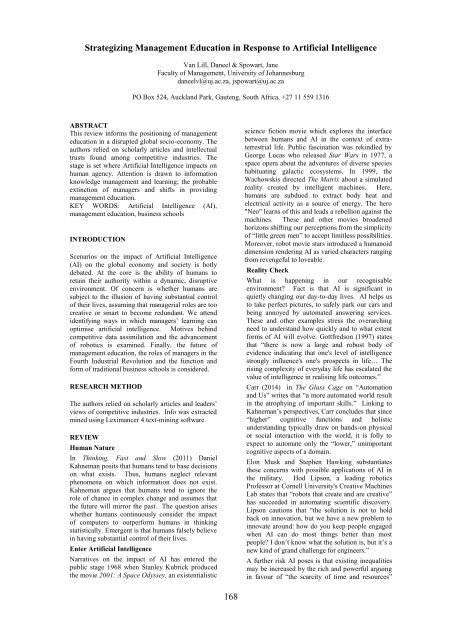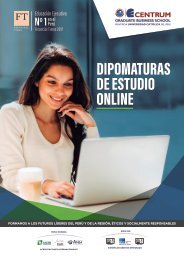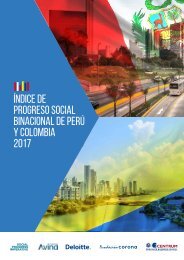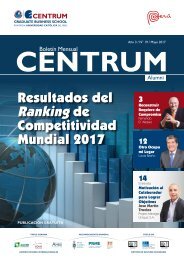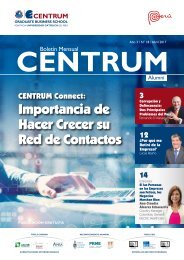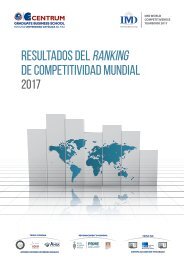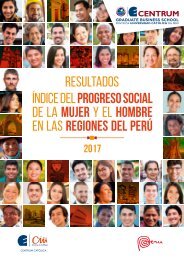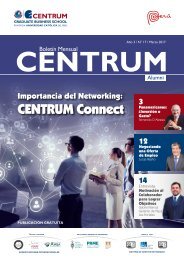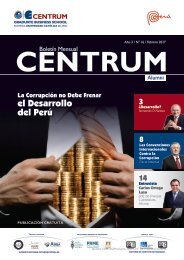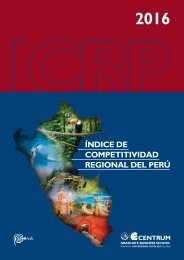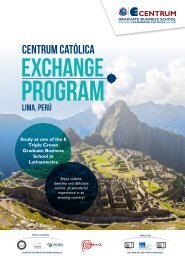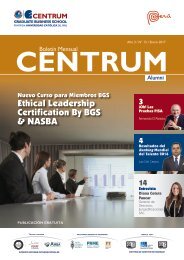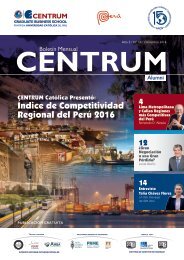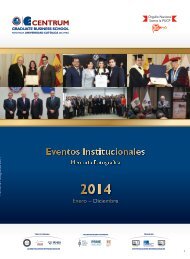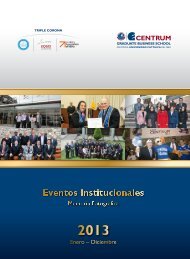Pan-Pacific Conference XXXIV. Designing New Business Models in Developing Economies
This publication represents the Proceedings of the 34th Annual Pan-Pacific Conference being held in Lima, Peru May 29-31, 2017. The Pan-Pacific Conference has served as an important forum for the exchange of ideas and information for promoting understanding and cooperation among the peoples of the world since 1984. Last year, we had a memorable conference in Miri, Malaysia, in cooperation with Curtin University Sarawak, under the theme of “Building a Smart Society through Innovation and Co-creation.” Professor Pauline Ho served as Chair of the Local Organizing Committee, with strong leadership support of Pro Vice-Chancellor Professor Jim Mienczakowski and Dean Jonathan Winterton.
This publication represents the Proceedings of the 34th Annual Pan-Pacific Conference being held in Lima, Peru May 29-31, 2017. The Pan-Pacific Conference has served as an important forum for the exchange of ideas and information for promoting understanding and cooperation among the peoples of the world since 1984. Last year, we had a memorable conference in Miri, Malaysia, in cooperation with Curtin University Sarawak, under the theme of “Building a Smart Society through Innovation and Co-creation.” Professor Pauline Ho served as Chair of the Local Organizing Committee, with strong leadership support of Pro Vice-Chancellor Professor Jim Mienczakowski and Dean Jonathan Winterton.
Create successful ePaper yourself
Turn your PDF publications into a flip-book with our unique Google optimized e-Paper software.
Strategiz<strong>in</strong>g Management Education <strong>in</strong> Response to Artificial Intelligence<br />
Van Lill, Daneel & Spowart, Jane<br />
Faculty of Management, University of Johannesburg<br />
daneelvl@uj.ac.za, jspowart@uj.ac.za<br />
PO Box 524, Auckland Park, Gauteng, South Africa, +27 11 559 1316<br />
ABSTRACT<br />
This review <strong>in</strong>forms the position<strong>in</strong>g of management<br />
education <strong>in</strong> a disrupted global socio-economy. The<br />
authors relied on scholarly articles and <strong>in</strong>tellectual<br />
trusts found among competitive <strong>in</strong>dustries. The<br />
stage is set where Artificial Intelligence impacts on<br />
human agency. Attention is drawn to <strong>in</strong>formation<br />
knowledge management and learn<strong>in</strong>g; the probable<br />
ext<strong>in</strong>ction of managers and shifts <strong>in</strong> provid<strong>in</strong>g<br />
management education.<br />
KEY WORDS: Artificial Intelligence (AI),<br />
management education, bus<strong>in</strong>ess schools<br />
INTRODUCTION<br />
Scenarios on the impact of Artificial Intelligence<br />
(AI) on the global economy and society is hotly<br />
debated. At the core is the ability of humans to<br />
reta<strong>in</strong> their authority with<strong>in</strong> a dynamic, disruptive<br />
environment. Of concern is whether humans are<br />
subject to the illusion of hav<strong>in</strong>g substantial control<br />
of their lives, assum<strong>in</strong>g that managerial roles are too<br />
creative or smart to become redundant. We attend<br />
identify<strong>in</strong>g ways <strong>in</strong> which managers’ learn<strong>in</strong>g can<br />
optimise artificial <strong>in</strong>telligence. Motives beh<strong>in</strong>d<br />
competitive data assimilation and the advancement<br />
of robotics is exam<strong>in</strong>ed. F<strong>in</strong>ally, the future of<br />
management education, the roles of managers <strong>in</strong> the<br />
Fourth Industrial Revolution and the function and<br />
form of traditional bus<strong>in</strong>ess schools is considered.<br />
RESEARCH METHOD<br />
The authors relied on scholarly articles and leaders’<br />
views of competitive <strong>in</strong>dustries. Info was extracted<br />
m<strong>in</strong>ed us<strong>in</strong>g Leximancer 4 text-m<strong>in</strong><strong>in</strong>g software.<br />
REVIEW<br />
Human Nature<br />
In Th<strong>in</strong>k<strong>in</strong>g, Fast and Slow (2011) Daniel<br />
Kahneman posits that humans tend to base decisions<br />
on what exists. Thus, humans neglect relevant<br />
phenomena on which <strong>in</strong>formation does not exist.<br />
Kahneman argues that humans tend to ignore the<br />
role of chance <strong>in</strong> complex change and assumes that<br />
the future will mirror the past. The question arises<br />
whether humans cont<strong>in</strong>uously consider the impact<br />
of computers to outperform humans <strong>in</strong> th<strong>in</strong>k<strong>in</strong>g<br />
statistically. Emergent is that humans falsely believe<br />
<strong>in</strong> hav<strong>in</strong>g substantial control of their lives.<br />
Enter Artificial Intelligence<br />
Narratives on the impact of AI has entered the<br />
public stage 1968 when Stanley Kubrick produced<br />
the movie 2001: A Space Odyssey, an existentialistic<br />
science fiction movie which explores the <strong>in</strong>terface<br />
between humans and AI <strong>in</strong> the context of extraterrestrial<br />
life. Public fasc<strong>in</strong>ation was rek<strong>in</strong>dled by<br />
George Lucas who released Star Wars <strong>in</strong> 1977, a<br />
space opera about the adventures of diverse species<br />
habituat<strong>in</strong>g galactic ecosystems. In 1999, the<br />
Wachowskis directed The Matrix about a simulated<br />
reality created by <strong>in</strong>telligent mach<strong>in</strong>es. Here,<br />
humans are subdued to extract body heat and<br />
electrical activity as a source of energy. The hero<br />
"Neo" learns of this and leads a rebellion aga<strong>in</strong>st the<br />
mach<strong>in</strong>es. These and other movies broadened<br />
horizons shift<strong>in</strong>g our perceptions from the simplicity<br />
of “little green men” to accept limitless possibilities.<br />
Moreover, robot movie stars <strong>in</strong>troduced a humanoid<br />
dimension render<strong>in</strong>g AI as varied characters rang<strong>in</strong>g<br />
from revengeful to loveable.<br />
Reality Check<br />
What is happen<strong>in</strong>g <strong>in</strong> our recognisable<br />
environment? Fact is that AI is significant <strong>in</strong><br />
quietly chang<strong>in</strong>g our day-to-day lives. AI helps us<br />
to take perfect pictures, to safely park our cars and<br />
be<strong>in</strong>g annoyed by automated answer<strong>in</strong>g services.<br />
These and other examples stress the overarch<strong>in</strong>g<br />
need to understand how quickly and to what extent<br />
forms of AI will evolve. Gottfredson (1997) states<br />
that “there is now a large and robust body of<br />
evidence <strong>in</strong>dicat<strong>in</strong>g that one's level of <strong>in</strong>telligence<br />
strongly <strong>in</strong>fluence's one's prospects <strong>in</strong> life… The<br />
ris<strong>in</strong>g complexity of everyday life has escalated the<br />
value of <strong>in</strong>telligence <strong>in</strong> realis<strong>in</strong>g life outcomes.”<br />
Carr (2014) <strong>in</strong> The Glass Cage on “Automation<br />
and Us” writes that “a more automated world result<br />
<strong>in</strong> the atrophy<strong>in</strong>g of important skills.” L<strong>in</strong>k<strong>in</strong>g to<br />
Kahneman’s perspectives, Carr concludes that s<strong>in</strong>ce<br />
“higher” cognitive functions and holistic<br />
understand<strong>in</strong>g typically draw on hands-on physical<br />
or social <strong>in</strong>teraction with the world, it is folly to<br />
expect to automate only the “lower,” unimportant<br />
cognitive aspects of a doma<strong>in</strong>.<br />
Elon Musk and Stephen Hawk<strong>in</strong>g substantiates<br />
these concerns with possible applications of AI <strong>in</strong><br />
the military. Hod Lipson, a lead<strong>in</strong>g robotics<br />
Professor at Cornell University's Creative Mach<strong>in</strong>es<br />
Lab states that “robots that create and are creative”<br />
has succeeded <strong>in</strong> automat<strong>in</strong>g scientific discovery.<br />
Lipson cautions that “the solution is not to hold<br />
back on <strong>in</strong>novation, but we have a new problem to<br />
<strong>in</strong>novate around: how do you keep people engaged<br />
when AI can do most th<strong>in</strong>gs better than most<br />
people? I don’t know what the solution is, but it’s a<br />
new k<strong>in</strong>d of grand challenge for eng<strong>in</strong>eers.”<br />
A further risk AI poses is that exist<strong>in</strong>g <strong>in</strong>equalities<br />
may be <strong>in</strong>creased by the rich and powerful argu<strong>in</strong>g<br />
<strong>in</strong> favour of “the scarcity of time and resources”<br />
168


